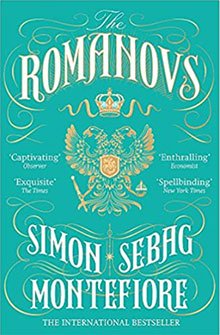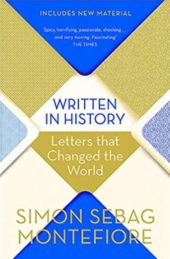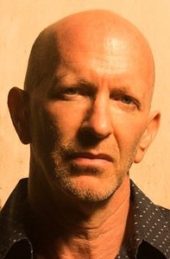June 2017
You are primarily a Russian historian and in 2016 published your book ‘The Romanovs’, the story of twenty tsars and tsarinas who were the most successful dynasty of modern times. Why did you write ‘Jerusalem: The Biography’ when all your other work is on Russia?
My Italian Montefiore family are Sephardic Jews with a special relationship with the city. My family motto is ‘Jerusalem’. My ancestor Moses Montefiore went and founded the new city of Jerusalem in the 1820s to the 1860s. He built the Montefiore Windmill which is still there. I have been brought up going to Jerusalem, and I always wanted to write a history of Jerusalem. The book is a love letter to Jerusalem, a special thing to do.
Why do you tell the story of Jerusalem like the story of a woman who is loved and abandoned and loved again?
We love that imagery. In the Torah and the Talmud, Jerusalem is sometimes portrayed as a beautiful woman wearing scarlet robes.
What do you think should happen now in Israel and Palestine?
I believe in a two state solution. Jerusalem should be the shared capital of both states. My book is very even handed. The extremists on both sides hate it because it recognises the full histories of both peoples. You can’t gain trust without understanding the full narrative of the other side.
Do you think there can soon be peace?
You need new leadership on both sides. The Netanyahu government has no intention of making a peace deal, you have the unelected octogenarian Mahmoud Abbas with Fatah, you have Hamas. The clock is ticking and if Israel doesn’t make a deal soon there will be a one state solution with a majority of Palestinian people in the Jewish state.
Can President Trump help to make a peace deal?
No, I don’t think he has a clue, but it is interesting to bring the Sunni Gulf monarchies into the peace process.
‘Jerusalem: The Biography’ was a family matter for you, and then you returned to the subject of Russia with ‘The Romanovs’. Is Russia also in your blood?
I love writing about Russia, and first of all for family reasons. In 1846 the same ancestor Moses Montefiore went to intercede against persecution of the Jews with the Tsar Emperor Nicholas 1st. Nicholas said to Moses, “If all the Jews were like you, it would be easier to be tolerant of them.” A highly patronizing comment!
Did you make a formal study of Russia when you were younger?
I studied Russia at Cambridge University, and was fascinated by Catherine the Great and by Stalin. In ‘The Romanovs’ I wanted to explain the exceptional nature and character of Russian power. I take it right up to Trump, who wants essentially to be an American tsar.
Was it difficult to cover this vast expanse of Russian history in ‘The Romanovs’?
The book handles it with a narrative, sequential story of how power worked over three or four hundred years. I wanted to explain the family, power, culture; all fused together. It was a difficult project to write a history book that also could be read by anybody, a saga of power, murder, intrigue, adultery, conspiracy and all the rest.
Do you write history as if you are writing a novel?
I always start with a Prologue to introduce atmosphere in a cinematic way and show the essential themes of the book, which I want to be academically correct and based on original archival research. I want the book to be literary and beautifully written, if possible. I am an independent writer, unattached to any institution, but I take the academics very seriously.
How well do you know Russia?
have been there a lot. Funnily enough ‘Catherine the Great and Potemkin: The Imperial Love Affair’ is now being republished in Russia, titled as ‘Catherine the Great and Potemkin: Conqueror of the Crimea’. And by the way Angelina Jolie is making a movie of the book in which she will play Catherine.
What difference do you see between Putin, Stalin and the tsars?
Putin is a fusion, a hybrid of Romanov Emperor, Stalinist General Secretary and modern 21st century politician. He deals in the world of television, of internet, of asymmetric warfare, and he is a master of very modern things, but many of his entourage call him ‘The Tsar’. He reads biographies of Romanov Emperors. I know he read my Catherine the Great book because in 2002 he discussed it with George W. Bush on the trip Bush made to St Petersburg.
Do you think it is correct to call Putin a modern day tsar?
The way the Putin entourage works is very similar, almost interchangeable if you put aside intercontinental missiles and digital warfare and look at the person. You have a tsar, a tiny entourage, completely opaque secret decision making – with vast fortunes and power delivered to people and taken away – and the desperate attempt of the single ruler to balance all these decisions and pressures. It is very similar to the way the Romanov court and Stalin’s court worked, and Putin is very aware of those two highly prestigious legacies.
Do these legacies affect Putin’s ideology?
He’s not really ideological. He looks at successful rulers of the motherland. Successful tsars for him would be Stalin, Nicholas I, Alexander I, Peter the Great, Catherine the Great; and unsuccessful ones for him would be primarily Gorbachev, slightly Yeltsin, definitely Nicholas II and Alexander II. He is interested in the success or failure of state power in Russia.
Would you say that Putin rules the Russian state with total power?
From the outside we look enviously at the swaggering strongman who can make any decision. Putin is President Trump’s dream character. Trump’s crush on the idea of Putin is partly the childish hero worship of this real estate magnate with a huge inferiority complex, who looks across and sees this leader with proper machismo and thinks: ‘God, in politics that’s what I want to be. He can do what he wants, isn’t paralysed by democratic procedures and a legislature that can’t decide anything.’ We don’t understand that Russian rulers are deeply insecure. In a system with no checks and balances, no boundaries, no restraint, they can do what they like on paper, but in actual fact they are very vulnerable.
What is Putin’s vulnerability?
One of the lessons of these Russian history books is that their rulers are most likely to be killed by their own courtiers and have to exist in a permanent state of ferocious vigilance. Looking from the inside, Putin is afraid every day about what could happen to him in the future and how to keep power for him and his small group.
Do you think Trump is in real trouble because of Putin?
Yes. My belief is that the Trump/Putin affair, the American/Russian scandal with links to Trump, is the greatest triumph of Russian intelligence in all of history. No Russian spymaster could achieve in their dreams the idea that Russian intelligence could separate and alienate the American presidency from their own security apparatus, which is amazingly what’s happened. They have partly paralysed American power. It is a great success for Russian spy craft.
Would you say that Russian spy craft is very sophisticated?
The Russians are super-sophisticated at understanding the internet for political manipulation. It’s ironic that what was invented in Silicon Valley by American ingenuity has been much better used by the denizens of a totalitarian system.
Did Putin’s background in the KGB help him to outwit the Americans?
Yes, they will be congratulating themselves on this. Putin is shrewd. Chosen almost at random by Yeltsin’s entourage, he is someone who has turned out to be a highly skilful opportunistic player, expert at exploiting the weaknesses of western democracies, which sadly today are plentiful. Someone who made their name in American reality television has been eaten alive by someone who has survived in the Kremlin almost 20 years.
Did the Russians really think that Trump would win?
The Russians were interfering in the elections, but thought that Hillary Clinton would win. Their aim was to undermine her Presidency as much as possible. The hilarious thing is that they would presume that if Hillary Clinton was the establishment candidate she would win. They think everything is fixed.
How much longer do you think Putin can last?
Another 20 years. Their great fear is people power like the Arab Spring happening there. If you talk to top Russian people, the thing that really spooked them was the killing of Gadhafi, because he was a leader who had been the established government of that country, backed by the Soviet Union for 30/40 years, suddenly just ripped to shreds on television. The only leader in the whole of modern Russian history who has been overthrown by popular protest was Nicholas 2. All the rest were killed by their own people or terrorists. In Russia once you have complete control of the security apparatus it’s quite difficult to overthrow a leader, but that’s their great fear anyway.
Is the world in a more troublesome period than usual?
It has always been unstable. I don’t really buy into people who say this is like the 1930s again. History never repeats itself anyway. The present is a fusion of different strands of the past. Mistakes repeat, but it’s always a fusion of the present too which makes it unique.
Can history really help us better to understand what is happening?
The more you know history the more useful it is, but it has to be a breadth of history. George W. Bush 2 loved reading history but he only read World War 2, Munich and 1940 and 1941 sort of history. So to him every foreign leader seemed like Hitler! We have to be careful. Generally Hitler parallels are a bad idea, especially for politicians.
What is your role as an historian?
To inform and to warn of dangers in the future, but also to entertain. When you look at the totalitarian century of blood that was the 20th century, society gets used to unacceptable things. That’s how the Holocaust happened. I’m not comparing Trump to Hitler, but what you see in American politics today is people getting used to things that should be unacceptable. Newspapers like the New York Times have a big role in keeping people aware of where things can go. The historian, the writer’s duty is to inform, to undermine, to question, to warn of the past.
Is the change and uncertainty we now experience a part of the democratic process?
This is a key point, which is which is why I’m not so alarmed at the moment. Democracy is designed to avoid violent revolutions by absorbing the dramatic changes of popular will. That is actually what’s happening. A lot of people can vote for Corbyn, for Donald Trump, for Macron, and throw out all the predictable candidates. That means democracy is still functioning.
In Russia they’re not used to this kind of change?
They regard periods of instability when new orders are emerging with absolute panic, and they immediately return to the old way of doing it.
Is it the case that, whatever else happens, above all they don’t want to be invaded?
Russia has no natural frontiers so Russia always feels hugely unstable. To us, looking at it from the outside, there’s always been this fear of a Russian bulldozer. In 1940 the Bolshevik hordes for the Nazis for example. In 1814 we were afraid of Russia dominating Europe when they made it to Paris, and now we’re obsessed Russia is going take over all our Internet and undermine everything. We have an instinctive fear of the East, while they’re terrified of being invaded and undermined.
Isn’t Russia itself a cultural hybrid?
It’s an empire and a collection of different peoples, that’s its fascination. In the early 90s I was a war correspondent in Georgia and Azerbaijan, where Russian power was suddenly vanishing. I was with all the warlords, a very exciting time for me.
Do you still write fiction?
I’ve just published ‘Red Sky at Noon’, the novel that completes my trilogy about a Jewish family in Russia in the 20th century. The first book is called ‘Sachenka’, the second ‘One Night in Winter’, and they are all being made into TV dramas or movies. I’m going to write a movie script, which is a new thing.
Do you prefer to write fiction or history?
I like writing fiction the most because I like to create characters. History is a huge task mentally, an almost physical intensive toil. Everything has to be correct, and if I’m doing one of these history books I literally immerse myself in the period.
What is your next subject?
I feel that with my body of work as an historian I’ve done enough on Russian monarchs and Russian dictators. If I’m going to do any more history it needs to be something fresh and completely different. Probably something more in the New World than the Old World.
Do you feel that to be a writer gives you prestige in today’s world?
From here we look at Italy and think that writers like Calvino are so respected, and everyone in the world wants to be a French writer because there you’re a star and they have the whole idea of intellectual prestige. America and France are the two places to be a writer. Here we have no prestige at all!






